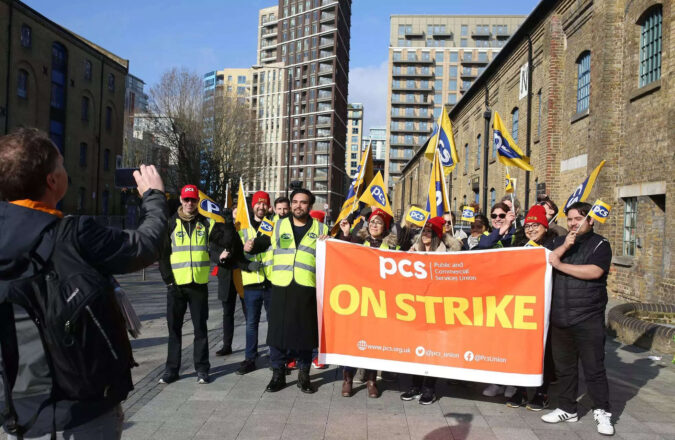LONDON: UK passport office workers launched a five-week stoppage Monday, the latest walkout in strike-hit Britain as the country reels from the worst cost of living crisis in a generation.
The Public and Commercial Services union (PCS) accused the government of failing to deal even-handedly with public sector workers.
The UK has been hit by a wave of industrial action across the economy in recent months ranging from ambulance staff and rail staff to doctors, teachers and dock workers.
Unions say their members have been hit by a combination of decades-high inflation and stagnating wages that has left them struggling to pay their bills.
Ministers had failed to “hold any meaningful talks” with civil servants despite negotiations having been opened with unions representing health workers and teachers, PCS general secretary Mark Serwotka said.
“They’re treating their own workforce worse than anyone else. They’ve had six months to resolve this dispute but for six months have refused to improve their two percent imposed pay rise, and failed to address our members’ other issues of concern,” he said.
“They seem to think if they ignore our members, they’ll go away. But how can our members ignore the cost-of-living crisis when 40,000 civil servants are using foodbanks and 45,000 of them are claiming the benefits they administer themselves?” he added.
The union wants talks about pay, jobs, pensions and conditions.
More than 1,000 members of the PCS civil servants union are due to take part in the walkout with picket lines mounted outside eight sites.
A nationwide walkout of more than 130,000 civil servants is also planned for April 28.
Prime Minister Rishi Sunak has rejected demands for big pay hikes in the public sector, saying they are unaffordable and will fuel inflation.
The UK government and teaching unions earlier this month agreed to hold “intensive talks” a day after health unions said they had reached a deal on pay.
But teacher union leaders said Monday that they rejected the latest pay offer and announced further walkouts.
The government had offered teachers a £1,000 ($1,231) one-off payment for the current school year and an average rise of 4.5 percent pay rise for next year.
But National Education Union (NEU) members in England voted to turn down the deal and to strike on April 27 and May 2.
“The offer shows an astounding lack of judgment and understanding of the desperate situation in the education system,” said Mary Bousted and Kevin Courtney, joint general secretaries of the NEU.
The Public and Commercial Services union (PCS) accused the government of failing to deal even-handedly with public sector workers.
The UK has been hit by a wave of industrial action across the economy in recent months ranging from ambulance staff and rail staff to doctors, teachers and dock workers.
Unions say their members have been hit by a combination of decades-high inflation and stagnating wages that has left them struggling to pay their bills.
Ministers had failed to “hold any meaningful talks” with civil servants despite negotiations having been opened with unions representing health workers and teachers, PCS general secretary Mark Serwotka said.
“They’re treating their own workforce worse than anyone else. They’ve had six months to resolve this dispute but for six months have refused to improve their two percent imposed pay rise, and failed to address our members’ other issues of concern,” he said.
“They seem to think if they ignore our members, they’ll go away. But how can our members ignore the cost-of-living crisis when 40,000 civil servants are using foodbanks and 45,000 of them are claiming the benefits they administer themselves?” he added.
The union wants talks about pay, jobs, pensions and conditions.
More than 1,000 members of the PCS civil servants union are due to take part in the walkout with picket lines mounted outside eight sites.
A nationwide walkout of more than 130,000 civil servants is also planned for April 28.
Prime Minister Rishi Sunak has rejected demands for big pay hikes in the public sector, saying they are unaffordable and will fuel inflation.
The UK government and teaching unions earlier this month agreed to hold “intensive talks” a day after health unions said they had reached a deal on pay.
But teacher union leaders said Monday that they rejected the latest pay offer and announced further walkouts.
The government had offered teachers a £1,000 ($1,231) one-off payment for the current school year and an average rise of 4.5 percent pay rise for next year.
But National Education Union (NEU) members in England voted to turn down the deal and to strike on April 27 and May 2.
“The offer shows an astounding lack of judgment and understanding of the desperate situation in the education system,” said Mary Bousted and Kevin Courtney, joint general secretaries of the NEU.
